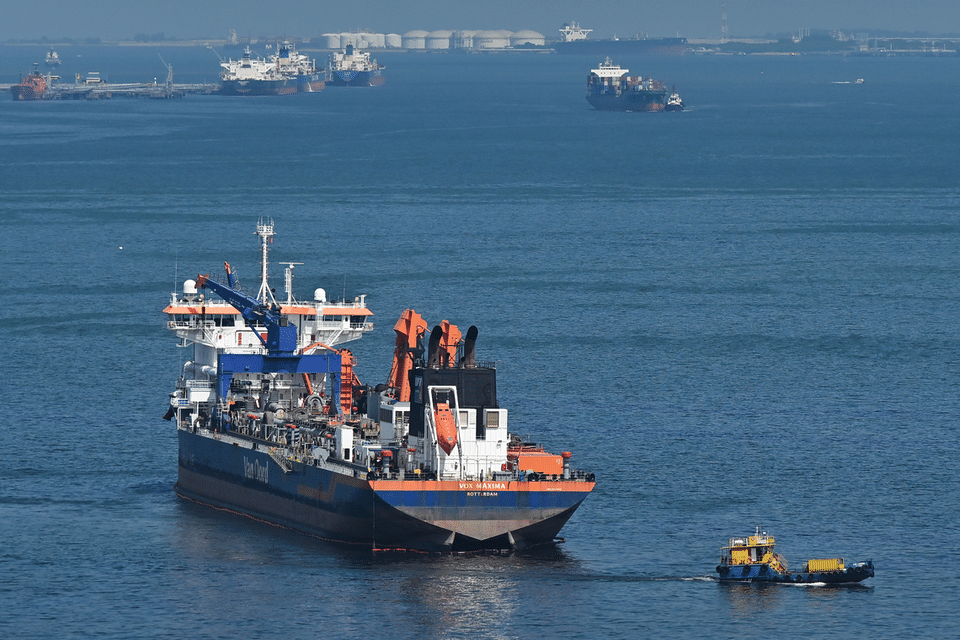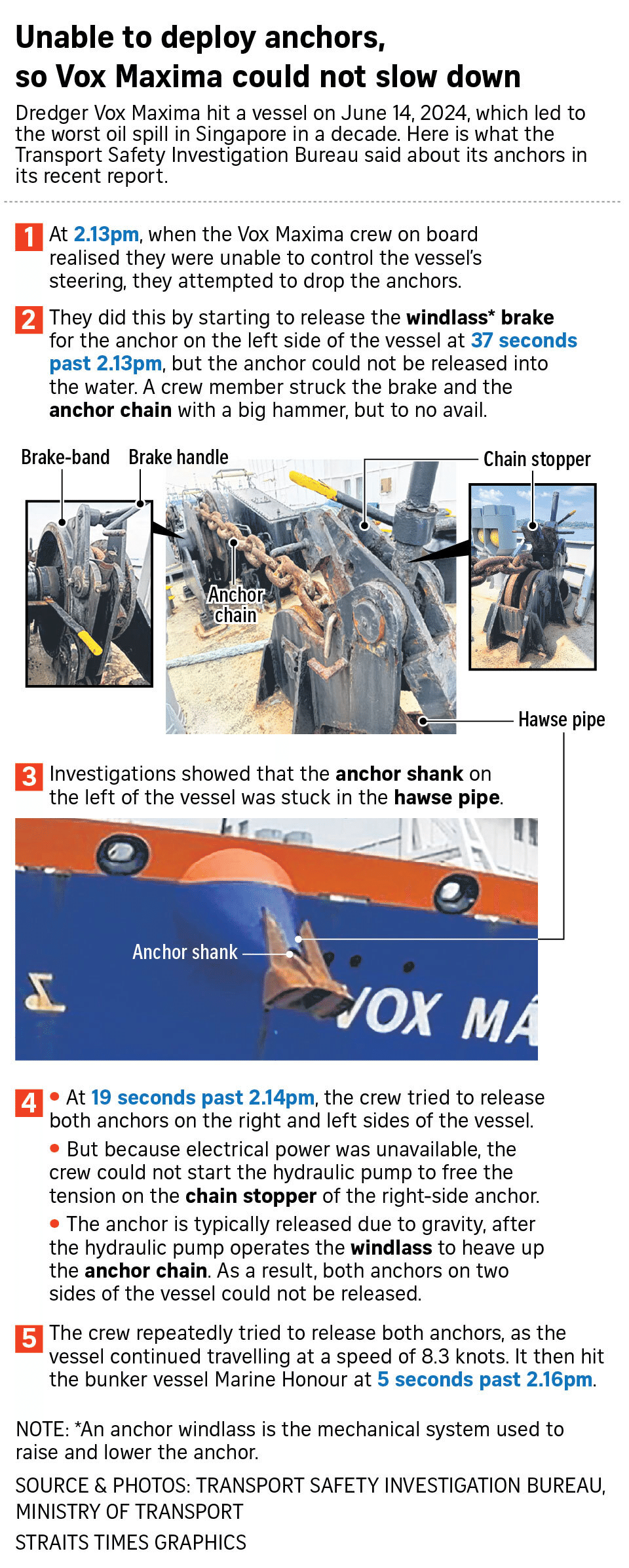October 2, 2025
SINGAPORE – Investigators found that the anchors on Netherlands-flagged dredging boat Vox Maxima could not be deployed, partially causing it to strike another vessel, which resulted in the worst oil spill here in a decade.
Other causes identified in the investigation report included a lack of proper handover processes and the absence of a task-recording system.
On June 14, 2024, Vox Maxima lost engine and steering control and hit Singapore-flagged bunker vessel Marine Honour, which was berthed at Pasir Panjang Terminal.
This caused 400 tonnes of oil to leak into the sea, staining the beaches at East Coast Park, Labrador Nature Reserve, Keppel Bay, the Southern Islands and Sentosa.
Clean-up operations, jointly organised by the Maritime and Port Authority of Singapore (MPA), National Parks Board, National Environment Agency and Sentosa Development Corporation, took over two months to complete.
The findings by the Transport Safety Investigation Bureau (TSIB), a department in the Ministry of Transport, also revealed that there was a third vessel – chemical tanker Super Hero – that had narrowly missed hitting Vox Maxima.
The report was published on Aug 15 and uploaded to the TSIB webpage on Aug 21.
Investigations showed that on the morning of June 14, 2024, the crew of Vox Maxima opened the circuit breakers on the right of the vessel to conduct an equipment inspection.
But they failed to restore the electric current in both circuit breakers when Vox Maxima prepared to depart the Western Working Anchorage near Sentosa for the ST Marine Shipyard in Tuas at 1.58pm.
The crew at the time included two local harbour pilots from service provider PSA Marine. Harbour pilots help to navigate vessels safely into and out of ports.
The dredger left the anchorage at a speed of 13.9kmh at around 2.08pm. As it entered the West Keppel Fairway near Pasir Panjang Terminal, it gradually increased its speed to 17.6kmh.
One of the two harbour pilots on Vox Maxima saw that Super Hero was 1.9km ahead, and tried to radio its harbour pilot to inform him that Vox Maxima was approaching, but did not receive any response.
At around 2.09pm, the harbour pilot on Vox Maxima reported to the Pasir Panjang control centre that he planned to keep Super Hero on the right when passing it. There was still no response from Super Hero.

Vox Maxima (above) lost engine and steering control and hit another vessel in June 2024, causing 400 tonnes of oil to leak into the sea. PHOTO: THE STRAITS TIMES
At 18 seconds past 2.12pm, the Vox Maxima crew started a hydraulic power unit to speed up the emptying of seawater to ensure safe passage towards the shipyard.
But this immediately caused a blackout on Vox Maxima. Super Hero was estimated to pass to the right of Vox Maxima in about 2 minutes 24 seconds.
The crew on Vox Maxima then realised they had lost steering control of the vessel. It was moving at 19.8kmh at 57 seconds past 2.12pm, while steering towards the right.
Its harbour pilot reported to the control centre at 2.13pm that the vessel had encountered an engine failure, and radio broadcasts were made to all nearby vessels.
Shortly after, he advised the crew to lower the left-side anchor, but it remained stuck even after a crew member struck the brake and anchor chain with a big hammer.
At 19 seconds past 2.14pm, the harbour pilot instructed the crew to release the right-side anchor. As electrical power was unavailable, the hydraulic pump could not be operated to free the anchor.
Both anchors could not be deployed, said the report.
At 51 seconds after 2.14pm, the harbour pilot requested the crew to reverse the engines so that the vessel could slow down or stop. But this failed as control of the engines had been lost.
At that time, Super Hero altered its course to move closer to its left, while Vox Maxima continued turning to its right.
At 15 seconds past 2.15pm, Super Hero passed the front of Vox Maxima, narrowly missing it by about 65m.
Meanwhile, the dredger, now moving at 15.4kmh, was about 220m from Marine Honour. The harbour pilot on Vox Maxima then called PSA Marine for urgent tug services to navigate the vessel.
Electrical power was eventually restored on Vox Maxima at 18 seconds past 2.15pm. The crew then set the engines to move backwards.
Vox Maxima then radioed another harbour pilot on a nearby harbour tugboat, PSA Phoenix CS09, to help push the dredger away from Marine Honour, but received no response.
At five seconds past 2.16pm, Vox Maxima hit Marine Honour, rupturing one of the oil tanks on the bunker vessel.

On April 2, four Dutch crew members on Vox Maxima were fined $20,000 to $40,000 each for failing to discharge their duties properly.
Attributing the loss of control of Vox Maxima to the tripping of a circuit breaker, TSIB said the morning-shift duty engineers did not reset the electrical power supply distribution after inspection works.
This created additional electrical load on the left-side circuit breakers, causing a loss of power to the steering gear.
Similarly, the afternoon-shift duty engineers did not notice the issue.
TSIB noted that the incident might have been avoided if there was a structured recording system to help reduce operational lapses. Such a system could also serve as a written brief during the handover of duties, rather than relying on crew memory.
It also cited the lack of emergency readiness of anchors on Vox Maxima as a cause. Anchors should be capable of being released immediately when the need arises, it said. Quick-release tests should also be done periodically, especially if an anchor has not been released for a while.
Another risk factor was the absence of responses to radio calls by the harbour pilots on Super Hero and tugboat CS09.
In the aftermath of the incident, the safety managers of Van Oord, the Netherlands-based company that manages Vox Maxima, issued a circular to other vessels in its fleet, highlighting the importance of emergency preparedness, said TSIB.
All vessels completed a drill simulating the loss of propulsion power in February. They also developed a checklist for electrical failure testing and recovery, and mandated an annual drill for electrical failure across its vessels.
Van Oord told The Straits Times on Oct 1 that it is dedicated to strong and adequate safety procedures, adding that it is reviewing TSIB’s report to see if it should further strengthen its procedures.
Additionally, PSA Marine informed all its tugboat masters to stay on top of radio communications, noted TSIB.
In the case of Super Hero, TSIB could not ascertain why its harbour pilot did not respond to calls from Vox Maxima and the control centre.
As for CS09, the harbour pilot had tuned both his radio sets to PSA Marine channels, instead of the designated channel for communications with nearby vessels and the control centre.
ST has contacted the owner of Marine Honour for its views on TSIB’s findings. MPA and PSA Marine declined comment.

